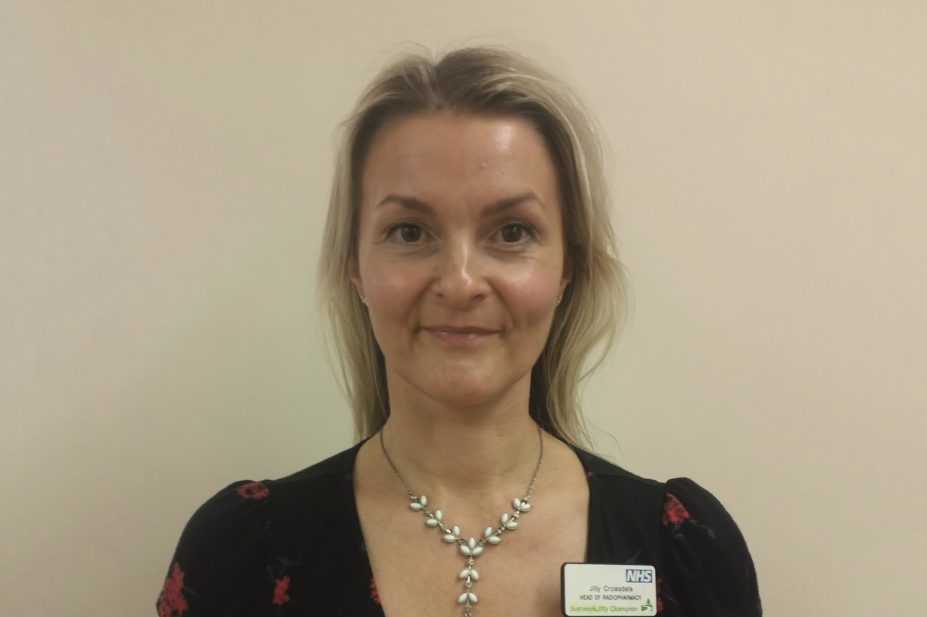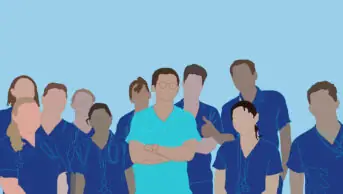
Jilly Croasdale is head of radiopharmacy and associate director of healthcare science at Sandwell and West Birmingham Hospitals NHS Trust. Here, she explains how she found her niche.
Why did you decide to specialise in radiopharmacy?
I ended up specialising in radiopharmacy by chance. I applied for a basic grade pharmacist job at City Hospital in Birmingham, with the intention of doing a clinical diploma, but there was also a role being offered in conjunction with a postgraduate diploma course in radiopharmaceutical science, run by King’s College London. I mentioned the word “radiopharmacy” in my application form, having recently given a presentation on the subject, and was offered the radiopharmacy job. I had not considered it previously but I thought, why not? I decided that if I did not like it, I could choose to do something else.
However, I found that I did like it. I enjoyed working in a multidisciplinary team with colleagues in nuclear medicine and liked the technical and professional aspects of the job. I have never found myself looking at my watch and wishing it was time to go home – I am fortunate that I found my niche accidentally.
What does your role involve?
Radiopharmacy involves the manufacture of sterile radioactive medicines, which are used as part of nuclear medicine studies. This may sound scary but it is safe as long as basic safety precautions are followed.
Fundamentally, a radiopharmaceutical is a complex formed of a useful molecule, which becomes attached to or used by the organ of interest, and a radioactive tracer, used to monitor and image the fate of the useful molecule — this tells us about the function of the organ. Since radiopharmaceuticals are medicines, pharmacists are often important for their release and, in some cases, manufacture, although some radiopharmacies with manufacturers’ specials licenses operate without involvement from a pharmacist.
My job has technical, managerial, scientific and clinical elements. Often I am releasing the products, where I check everything and confirm the products are fit for use. However, I also manufacture the radiopharmaceuticals by making up the radioactive complexes in our clean room.
I am the quality controller, so spend time working on the quality management system, ensuring that our processes and procedures are comply with the principles of good manufacturing practice (GMP), and making sure that any quality exceptions, such as errors and deviations from normal process, are properly documented, investigated and acted upon.
Additionally, I help run a radioiodine clinic for patients with hyperthyroidism — it is nice to see the occasional patient. And, although I do not do a lot of research nowadays, I support my trainee clinical pharmaceutical scientists in doing so. My current trainee is investigating the standardisation of radioactive test meals for gastric emptying studies, which will enable us to image and measure how a patient’s stomach is emptying, for example.
I currently chair the UK Radiopharmacy Group, and am also the treasurer for the British Nuclear Medicine Society (BNMS), so I spend some time working on things for that, such as helping develop national guidelines.
Which skills have you learnt as part of your role?
As well as the things you would expect, such as the technical skills required to make radiopharmaceuticals, I have learnt many things I did not expect, such as how to manage the finances and develop prices for the radiopharmaceuticals we supply to our customers. I recently completed an Institute of Leadership and Management (ILM) Level 7 Certificate in Strategic Leadership, and my leadership skills have developed. I enjoy leading my team and seeing them grow.
When I started in radiopharmacy, there was no structured career pathway, although I did complete the postgraduate course in radiopharmaceutical science at King’s College London. However, there is now a training scheme for clinical pharmaceutical scientists run by the National School of Healthcare Science, during which students are based in hospital and paid a salary. During their work-based placements they must undertake competencies in radiopharmacy; quality assurance and control; production and aseptics, and these are supported by academic modules at the University of Manchester. On successful completion of the three-year course, students are eligible to register as clinical scientists with the Health and Care Professions Council.
Of which career achievement are you most proud and why?
Radiopharmacy is considered a healthcare science discipline and, as head of department, I was eligible to apply for the role of the associate director of healthcare science in my trust. I currently represent all the healthcare scientists within the organisation and it has been great to learn more about other areas. I organised an innovation afternoon at which scientists from different departments presented their research. Here, I learnt about remote monitoring of patients’ pacemakers and how to detect sepsis at an earlier stage, for example.
I have also been working with the local STEM (science, technology, engineering and mathematics) network and with local schools to inform students about their future career choices, arranging science taster days and work experience within the trust. Having young people in your department enthusing about the work you do gives everyone an energy boost.
What are the main challenges you have to overcome as part of your role?
Sometimes managing the professional and business parts of the job can be challenging. With increasing emphasis on finance, hospitals are having to become more business-like, which is not always a bad thing. However, it can pit you against colleagues in neighbouring trusts, who are often also part of your contingency plans. I believe that NHS trusts should work together for the best interest of patients, which means supporting my neighbours so that their patients do not suffer. For example, there was a shortage of the radioactive starting material molybdenum-99 a few years ago. Some hospitals were more heavily affected than others, depending on where they sourced their molybdenum. We successfully worked together in this situation so all patients received their tests and treatment.
You may also be interested in
